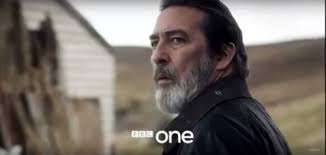I am currently suffering from a massive dilemma. The last episode of Undercover (BBC, 2016) is sitting on BOB waiting for me to watch it and I just don’t dare to. Don’t get me wrong, I thought it was a terrific drama: the pleasure of getting to watch Adrian Lester and Sophie Okonedo in fully fleshed-out parts was something that television doesn’t afford us often. The moment Lester confronted the death of his father or indeed made the decision not to attend to his death was particularly touching, played very understatedly, but executed perfectly. Okonedo did exceptionally well at making her character believable at different stages of her life and career – from hesitant human rights activist to one of the top lawyers, later prosecutors in the country and the US. The story was intriguing and nicely interwove political criticism with deeply touching stories of private lives. It was, in other words, really good ‘Quality British Drama’ as the BBC would have it. I mean, look at it, look at it:
And yet I avoid the last episode.
The reason for this is simple: I have watched too many so-called quality TV dramas from this country recently that totally ruined it all with the last episode. Did you watch Unforgotten (ITV, 2015) in October last year? Trevor Eve has rarely been so good, and Nicola Walker always brings a detached intensity to her roles. Sanjeev Bhaskar played her long-suffering partner in a likeable manner that perhaps took us straight back to George Carter (Dennis Waterman) in The Sweeney (ITV, 1975-1978). The plot was expertly developed and interwove several stories in a competent and compelling way. And then came the last episode.
Similarly, Shetland (BBC, since 2013). I didn’t like the first season at all, but this year’s was pretty intriguing. The acting was also pretty spot-on, but I think I particularly liked the subtle meshing of private and criminal storylines which turned out to be deeply political. The best thing about it was that in the process of this boundary blurring, the private storylines become deeply political. It was really interesting. And then came the last episode.
I now have to post a massive spoiler. So for those of you who are still planning to watch them, look away now.
For the rest of us: the last episode was a massive spoiler. Both serials ended really rather predictably with a solution of ‘the mentally unstable woman did it’. Seriously. Seriously?
In Unforgotten, the mental instability had been caused by post-natal depression. Seriously. Post-natal depression. Look up post-natal depression and you will find that mothers with this mental health problem do sometimes kill themselves or their children, but rarely – practically never – anyone else. Post-natal depression remains a taboo subject in a society that still puts quite a bit of unhealthy value on women’s ability to mother. If you think we’ve moved away from a sentimentalist conceptualisation of women as ‘saintly mothers’ who instinctively know what is right for their child and hence know exactly what to, then go and watch Mother’s Day (Garry Marshall, 2016) though I can really not recommend it. So presenting post-natal depression (which raises its ugly head for most women at some point, even if it’s just the ‘three day blues’) as a explanation why a woman would go out and kill people is lazy to say the least.
In Shetland it was the mentally unstable young woman whose mother committed suicide and who hence was out to kill the person she thought responsible, killing anyone else in the process. This was the resolution to a story about corruption at the highest levels of the legal system in Scotland, its relationship to organised crime and its willingness to abuse its power in any way possible: it’s the woman whose mother killed herself. There’s hardly a need to state that this was deeply unsatisfying and deeply offensive.
In addition, of course, as others would point out (see for example Wahl 1992, 2003, Sieff 2003), these regular portrayals of mental health as the cause for people to commit murder are hardly helpful and rest on a problematic stereotype. Instead the media has, in the case of public service channels, or should have an obligation to inform the public about mental health so that those without direct contact to sufferers can understand the issues better. In addition, all these portrayals do is stigmatise mental health further. Dramas which find in mental health a convenient resolution to a crime narrative do nothing to help with that.
What a difference soap opera offers, in comparison. I’ve fallen back in love with EastEnders (BBC, since 1985). I’m still struggling to keep up, but watching it makes me realise how good the soap is. So, yes, camera angles are a little repetitive and the sets look a bit wobbly (though not as obviously as on Crossroads), but acting is largely solid, considering the time constraints, and storylines are significantly better developed than in either Unforgotten or Shetland. EastEnders recently featured a story of post-partum psychosis (from December 2015 onwards) which was handled extremely well. We got to see several sides to the story, including getting a sense of what it was like for Stacey Branning/ Slater (Lacey Turner) as well as her bewildered partner and friends and family. Clearly, the writing team had done their research and worked with a charity to develop that storyline. As a result, EastEnders managed to give the impression that the condition was taken seriously, and with it the lives of women who suffer from post-partum psychosis or similar conditions. In addition, the continuing storyline of the soap opera also offered the chance to develop the character as surviving the psychosis, and she was shown to be stronger as a result.
What is interesting is that this space to take women’s lives seriously remains confined to soap opera rather than ‘quality drama’. Nothing much, it seems, has changed since the 1980s when early feminist television scholars were turning their attention to that genre because they recognised how important soap opera was to women as viewers. As Christine Geraghty put it in her reflection of that period (2013: 21) the scholars at that time felt that soap opera, although ‘largely contemptible’, was offering better places to develop representations of women than other forms of drama. I would go further now: soap opera is, as far as sensitive handling of difficult storylines is concerned, and where the personal returns to being the political, by far the best genre that exists in TV. Soap opera is the true quality genre in that respect.
So, what shall I do? Give the last episode of Undercover a go, or return to the safe haven that is the quality of soap opera?
Elke Weissmann is Reader in Television and Film at Edge Hill University. Her publications include Transnational Television Drama (Palgrave Macmillan) and Renewing Feminisms (I.B. Tauris) with Helen Thornham. She is vice-chair of the Television Studies Section of ECREA, and part of the Critical Studies in Television team. She’d like to express her gratitude to the many fabulous feminists who continue to keep her on the toes, not least the ones cited in this blog.





